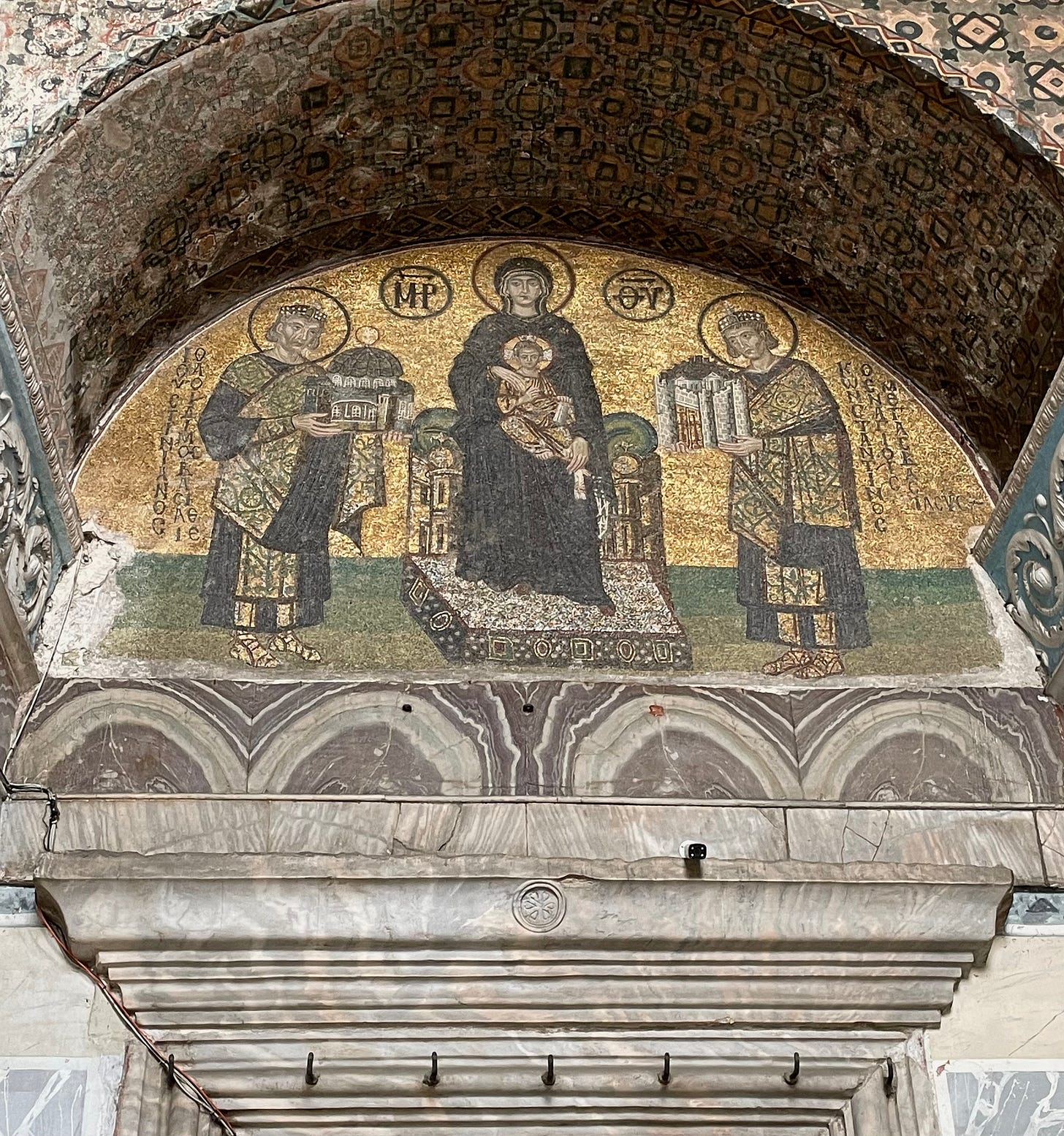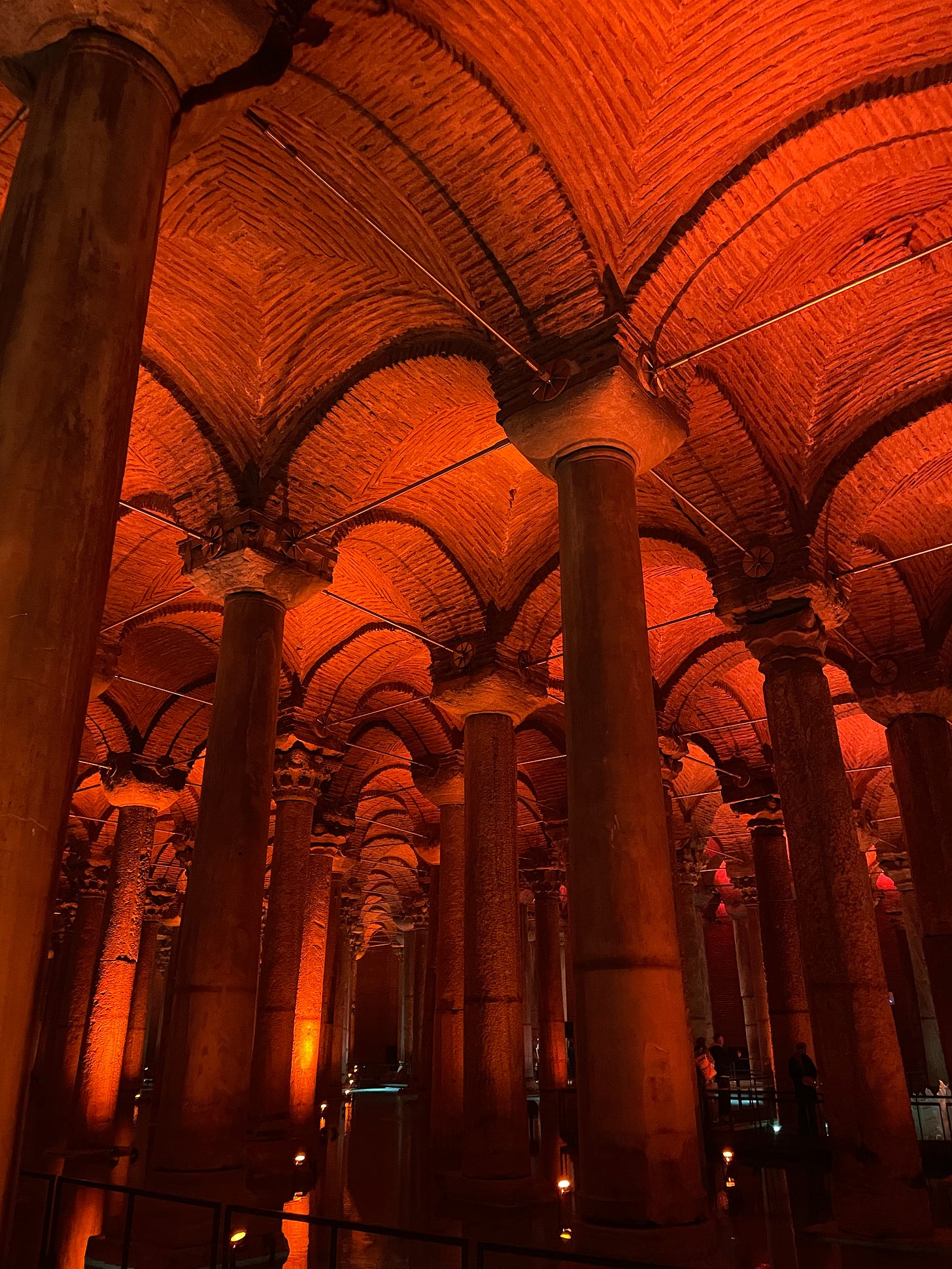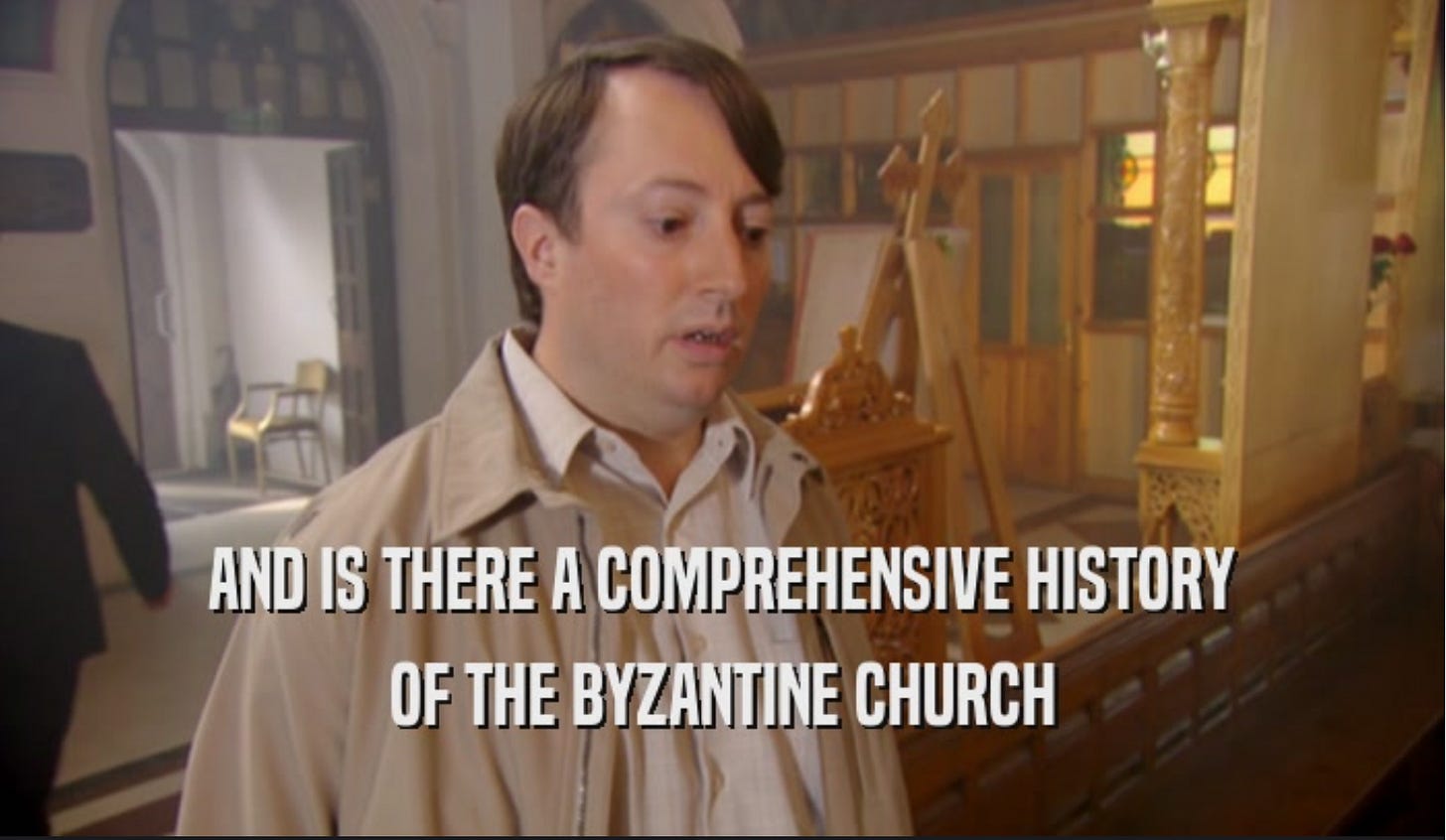I spend a godawful amount of time thinking about Byzantium.
You could say, in fact, that the Byzantine Empire is, like, my Roman Empire.
It is also actually just the Roman Empire, only it’s the part that no one really knows or even cares about.
I realise that every piece I’ve written for Substack so far has tangentially referenced Byzantium without offering a detailed explanation as to what, exactly, the Byzantine Empire was — or is.
Without it sounding like too much of a cop out, I think that this is because I’m extremely hesitant to actually delve into the mess that is the world of Byzantium, as much as I profess to love it.
Spending time trying to detangle the extraordinarily knotted web of a thousand years of Byzantine history for a general audience is something of a terrifying prospect. In the first instance, the society itself is deeply complex and inherently contradictory. Its ongoing survival represents something of an historical anomaly. Indeed, preeminent Byzantinist John Haldon calls Byzantium’s survival a ‘paradox,’ one which seems to flout all known laws of history, all prescriptions which define the life cycles of empires, all those insistences that a successful religious ideology must be constructed on an edifice (however fragile) of unity.
The Byzantine Empire is ultimately an incredibly confused mesh of oppositional information, forged upon a false (initially derogatory) name and identity, which were only ever intended to differentiate the field from the more respectable realms of Classics and (Western) Medieval History. It represents a very difficult inflection point, straddling the ancient and the medieval, the east and the west, the Roman and the Greek, the Roman and the Greek and the non-Roman and non-Greek, the Christian and the non-Christian, etc., ad infinitum.

Then you’ve got to deal with the not-so-fun-fact, that the ‘Byzantine’ Empire never actually existed. ‘Byzantines’ called themselves Romans, and continued to do so throughout their history. From about the ninth century onwards pretty much everyone in the West called them ‘Greeks,’ because the Germans started trying to claim they were actually the Romans (…). Thanks, Charlemagne. Their neighbours in the Islamic caliphates continued to refer to them as Romans, though. In any case, the word ‘Byzantium’ is an invention. Well, truthfully, it is a Latinisation of the original name for the seventh-century BC city where modern Istanbul sits, that Constantine decided to (not at all egotistically) rename in his honour in 330 AD: Byzantion.
People frequently ask me if they’re pronouncing ‘Byzantium’ correctly. Is it BY-zan-tium, or Biz-an-tium, or Bys-antium or, or, or…? Similarly, wait, so is it the BIZ-antine Empire or the BY-zantine Empire or the BIZ-AN-tine Empire…? And I always grimace slightly, because I will have to offer an inevitably long-winded and largely unwanted explanation that it doesn’t actually matter, because it’s all fake anyway.
Why did I call it Byzantium, then? Because it’s easier? I don’t know.
It’s made my life very irritating. I’m sure it has made the lives of other scholars very irritating. If you want to listen to a scholar who is really irritated and very eloquent about it, I’d advise checking out the work of Anthony Kaldellis, historian of the Eastern Roman Empire and intellectual light of the field. At the end of the day, it’s really only still called Byzantium for simplicity’s sake — odd when it doesn’t make anything simpler, because no one knows what Byzantium is anyway.
The name ‘Byzantium’ only really came into existence in the sixteenth century, with the rise of humanism and the growing (Western) interest in Classical, Greco-Roman histories. ‘Byzantium’ was a convenient way to separate this later iteration of the Hellenistic past from the ‘truly’ Classical shit, whilst also differentiating it from the new, decidedly ‘Eastern’ Ottoman Empire now ascendant on the Bosphorus. ‘Byzantium’ allowed for some distancing between the West and the ‘East’ that it had represented, whilst not allowing it to be as fully orientalised as the Ottoman Empire. Kaldellis argues that the name was only really popularised by the nineteenth century, when modern Greek ethnic and national identity was being shaped in opposition to the Ottoman rule.
This paradoxical, dual nature of the word and the identity of the Empire tied up with it has allowed the West to both claim and reject Byzantium. Much of the pre-twentieth century scholarship on the period (and, in fact, in a lot of the scholarship that can be found even into the twentieth and twenty-first centuries) has presented the Byzantine state as both a ‘bulwark’ against the encroaching tides of Islam and a corrupting, effete, despotic force which had to be defended against by the true, pure inheritors of the Catholic Church and the Classical past.
As a side note, if I see one more respected scholar use the word ‘bulwark’ in reference to Byzantium and the Islamic world, I’m going to sue for damages.

I often think about the A-level History question par excellence concerning Byzantium’s far more famous, far less Roman cousin, the aforementioned Germans: how far do you agree with the statement that the Holy Roman Empire was neither Holy, nor Roman, nor an Empire?
In my version, though…
How far do you agree with the statement that the Byzantine Empire was neither Byzantine, nor an Empire, nor a real historical fact?
But I am coming to realise that I can’t even start to address these issues without going right back to the beginning, as scary as that may be. I can’t make more people care about the Byzantine Empire, and why it actually is not the Byzantine Empire, if people don’t even know what I’m talking about when I say Byzantine Empire.
I think what Byzantium’s widespread invisibility and misidentification reveals is a fundamental flaw in the way that we not only teach, but perceive, history. In the institutions of Europe and America, it tends to be something that flows out from and around the West. Recent attempts towards researching and teaching a ‘global’ Middle Ages mark an important step in the right direction, but as highlighted by Dr. Rachel Sine in her recent article ‘The Intricate World and the Mundane University’, these attempts are still broadly Eurocentric, and often come at the expense of academics, because whilst institutions can claim to be broadening their medieval horizons by hiring an expert in the ‘global’ Middle Ages, they will frequently use this singular individual, or a small group, to reduce hiring costs, by not hiring out academics who teach in a specialised region from outside of Europe. For instance, avoiding hiring two experts on Medieval China and India in favour of one person who just does ‘global’ Medieval Studies. This results in an oversimplified, understaffed, under-researched department, as well as an oversimplified and under-researched ‘global’ Middle Ages.
Even more critically, the ‘global’ Middle Ages is only ‘global’ from our perspective, that of the West. We stand on the piles of our history, looking out from the ravages of our civilisation towards those that we have abused, conquered, and pillaged over time. We make reference to their civilisations as cases of oddity and strangeness, ‘different’ because they are different to the West. But, to everyone else, it’s just history, just a period in their past/s; in many cases before they ever had to make direct contact with the stinging tentacles of the Western world.
I think Byzantium has been excised from the broader historiographical discussion because it sits weirdly and uncomfortably between these two truths. It offers a counterpoint to the Western perspective, in many ways anti-Eurocentric. But at the same time, claims that have been made by Western scholarship to some aspects of its history mean that we cannot slide it into a ‘global’ model of the past, because the civilisation has to a large degree been constructed through the Western imagination. However, this uncomfortable position may actually represent the Byzantine Empire’s greatest utility to the discipline: it necessarily exists in paradox, and so it challenges our traditional notions of the past as deterministic, linear, or sensical.
So we must return to the beginning. We must sit down and talk about the two crucial issues at the heart of this rant: what the fuck was the Byzantine Empire? And why did it never actually exist? It is only from there that the more important question can be really tackled: why does next to no one outside of academia (with the exception of Mark from Peep Show) know anything about this civilisation, which lasted for a millennia and represents the continuation of the Empire that everyone apparently can’t stop thinking about?

To try and answer these questions, I’ve decided to produce a series on Byzantium, a basic overview beginning with the first, unstable years of Diocletian’s Tetrarchy and the rise of Constantine in the third and fourth centuries, to the dying gasps of the Palaiologan dynasty in the fourteenth and fifteenth. The issue is, as always seems to be the case with the Byzantine Empire, that things are never basic. This is an empire of the imagination, to a large extent, dreamed up by scholars in the years following its fall, and which has only recently come to some level of academic prominence alongside other, preferable disciplines.
Moreover, our relative distance from the cultural attitudes and socio-political and economic paradigms that defined the Byzantine Empire leave scholars constantly grasping at straws, struggling to reconcile our pre-existing biases and preconceived paradigms with near-alien concepts of law, order, hierarchy, gender, ceremony, civic responsibility, political leadership, religion and faith and devotion, food, geography, etc., etc. The past is a foreign country, perhaps nowhere more so than Byzantium.
Finally, it is worth stating that I’ll continue to use the term Byzantium, as inherently difficult as this name and concept is. Explaining to people, even some historians of other scholars, that what I study is really the Roman Empire writ anew adds a layer of confusion to an already confused state of affairs. Besides, this Substack is called the Empress of Byzantium and not the Empress of the Eastern Roman Empire. It’s my brand and it’s also just pithier.
But, before scholars in the discipline come for my neck, I’ll qualify that by saying that I believe there is something to be said for using terms that are at least distinguishable and defining to begin explaining and exploring the period that we have elected to study. As researchers and educators, we bear responsibility for making the period we study accessible to a wider public, in the name of public good and the acquisition of public knowledge.
Personally, I believe that accessibility will come from working within already established parameters, which make Byzantium recognisable and distinct from other periods, to some degree. This recognition comes from the name. Calling it the Eastern Roman Empire will, at this stage of lesser public acclaim, result in the promotion of the discipline falling into the trap of over-explanation and under-appreciation. In my experience, Byzantinists are fond of precision and of hammering a point home. Both of these are important in the academic sphere, but getting into the nitty-gritty nuances of how the entire empire is actually an historical construction in the first five minutes of introducing the subject to someone is probably not going to end all that well.
In the interest of brevity, I’m going to end my rant/justification here. But not without a quick overview of what is to come, partly for my own accountability. Starting from next week, I’m going to publish one article per week covering an aspect of Byzantine history, in chronological order. The first piece is on the transitional period of Diocletian’s Tetrarchy, dealing with the final heyday of the ‘Classical’ Roman Empire. I’m still going to write my longer-form pieces which integrate what I do with relevant, contemporary issues, but these will be on a more regular, monthly schedule. I’m also going to try & put together some reading lists, as well as a sort of master-list for getting started on Byzantium, so hold tight for those.
Who knows? Maybe the Byzantine Empire is about to become a lot of people’s Roman Empire. Or maybe I’ll just succeed in making one more person realise that, actually, the Byzantine Empire was actually still just the Roman Empire, and I’d be happy with that, too.




Instantly subscribed! I love a rant, and this was 100% justified.
My husband and I recently visited Athens and Crete, and despite our combined historical knowledge, we came away with an even greater appreciation for the slippery nature of 'historical communication'. Even something as simple as the designation 'Minoan' shows how uncomfortable we are with the undefined. Of course, as you point out, this sometimes is a necessary evil, but it is often unspoken.
You got me here with the screenshot from Peep Show. Good choice.